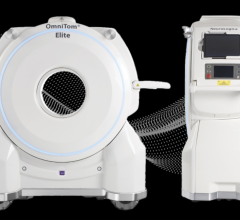July 2, 2015 - Mevion Medical Systems announced delivery of the superconducting synchrocyclotron accelerator for its Mevion S250 proton therapy system for installation at University Hospitals (UH) Seidman Cancer Center and UH Rainbow Babies & Children's Hospital in Cleveland.
The accelerator is the core of the proton therapy system, and its installation is a crucial step in the deployment of the system at UH. The unit will be the first proton therapy system in Ohio treating adult and pediatric cancer patients when it begins clinical operation in the spring of 2016. This is the sixth accelerator delivery for Mevion.
"We are extremely excited to bring this leading-edge proton beam facility to Ohio," said Nathan Levitan, M.D., president of UH Seidman Cancer Center. "As a national leader in cancer care, University Hospitals Seidman Cancer Center is committed to providing patients with the most advanced cancer-fighting technology and treatments. The addition of the Mevion S250 will be a great complement to our existing state-of-the-art radiation oncology equipment and expertise and will benefit patients with many different types of cancer. Additionally, it provides a distinct advantage to our pediatric patients and their families at UH Rainbow Babies & Children's Hospital, eliminating the need to travel out of state for this technology, which results in fewer long-term effects due to the precisely targeted therapy."
Proton therapy is an advanced form of radiation therapy that targets cancer cells more directly while sparing much of the surrounding healthy tissue, thus making it ideal for treating pediatric patients as well as adults with cancer in sensitive locations such as near the heart or brain. Traditional proton therapy systems cost hundreds of millions of dollars to build and are typically the size of a football field. However, the Mevion S250 provides precise, effective and efficient treatment without the complexity of traditional systems. In addition, the capital costs and the operating costs are significantly less as the Mevion S250 requires less space, less staff and less energy than other proton systems.
Following the installation of the accelerator, the system will undergo proton beam tuning and acceptance testing to verify that it meets precise technical and clinical requirements before being commissioned for clinical use. It is expected to begin treating cancer patients in the spring of 2016.
Currently, three Mevion S250 proton therapy systems are in clinical operation treating patients.
For more information: www.mevion.com


 August 09, 2024
August 09, 2024 








